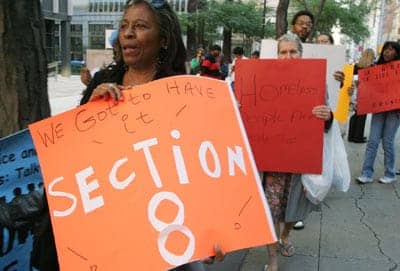by Lynda Carson
Oakland – The Oakland Housing Authority administers 13,259 Section 8 voucher units in Oakland, owns and operates around 3,300 conventional public housing units, and assists about 10 percent of Oakland’s low-income families with their housing needs. San Francisco has 8,611 Section 8 units, Berkeley 1,939, the Housing Authority of Alameda County 6,097, Richmond 1,750, Marin County 2,145, and Contra Costa County Housing Authority 6,763.

Now massive spending cuts to the nation’s federal housing programs are scheduled to go into effect on March 1, 2013, threatening thousands of low-income families in Oakland and other Bay Area cities with higher rent than they can pay. Additionally, several hundred thousand or more low-income families all across the nation could lose their vouchers.
On Jan. 23, the Washington Post reported that top leaders in both major political parties predicted that massive across-the-board spending cuts to the nation’s domestic programs and the Pentagon known as “sequestration” will go into effect on March 1 as scheduled, at least temporarily.
“It’s going to happen,” said Sen. Richard Durbin, D-Ill., adding that Republicans in both chambers are determined to make $1.2 trillion in spending cuts during the next decade.
The latest deals in Washington that were agreed upon by the Democrats and Republicans since late December to avoid a fight over the nation’s debt ceiling and to avoid going over the so-called “fiscal cliff” resulted in more than 80 percent of the Bush era tax cuts remaining in effect and $110 billion in automatic spending cuts scheduled to go into effect on March 1. Additional spending cuts of around $110 billion per year are also scheduled to go into effect during the next 10 years.
Massive spending cuts to the nation’s federal housing programs are scheduled to go into effect on March 1, 2013, threatening thousands of low-income families in Oakland and other Bay Area cities with higher rent than they can pay.
The catastrophic spending cuts scheduled to occur on March 1 threaten many of the nation’s domestic anti-poverty programs, including the housing programs, pitting the needs of the elderly, disabled and the poor against the over-bloated military budget and the interests of wealthy Pentagon contractors.
As a direct result of the latest so-called fiscal cliff deal, the spending cuts to the nation’s housing programs threaten at least 250,000 voucher holders across the nation with eviction, if the cuts go into effect on March 1 as scheduled. The cuts also threaten tens of thousands of low-income renters who reside in so-called affordable housing developments owned and operated by local nonprofit housing developers in the Bay Area and across the nation.
The scheduled catastrophic spending cuts threaten the nation’s federal housing programs administered by the U.S. Department of Housing and Urban Development (HUD), including $1.53 billion to be cut from HUD’s Section 8 tenant-based rental assistance (Housing Choice Voucher Program), $772 million from Section 8 project-based rental assistance, $325 million from the public housing operating fund, including an additional cut of $154 million from public housing capital funds, $31 million from elderly senior housing, $14 million from housing for people with disabilities, $27 million from housing for people with AIDS, plus $74 million from the USDA’s rural housing program and $156 million from homeless assistance grants.
The spending cuts will also affect local housing programs in Berkeley, San Francisco, Alameda, Richmond, Alameda County, Contra Costa County, Marin County and throughout California.
The catastrophic spending cuts scheduled to occur on March 1 threaten many of the nation’s domestic anti-poverty programs, including the housing programs, pitting the needs of the elderly, disabled and the poor against the over-bloated military budget and the interests of wealthy Pentagon contractors.
The City of Los Angeles faces a massive $48 million spending cut to their Section 8 housing voucher program. According to the LA Times, in a report submitted to Mayor Antonio Villaraigosa on Jan. 3, City Administrative Officer Miguel Santana stated that an estimated 15,000 families that rely on housing vouchers would on average see their rent expenses increase by $116 per month if Congress fails to block the automatic across-the-board spending cuts scheduled for March 1.
Additionally, the Housing Authority of Los Angeles County seeks HUD approval to terminate rental assistance for 1,800 families if the spending cuts take place or to raise the rents on 21,132 households.
In Sacramento, according to the website for the Sacramento Housing and Redevelopment Agency, if the spending cuts take effect, they will have to take back around 950 vouchers from households in the Section 8 Housing Choice Voucher Program.

More than 900 organizations nationwide have spoken out against the massive spending cuts. In a call to action, activists continue to urge low-income families in the federally subsidized housing programs to immediately contact their representatives and to urge the Obama administration and Congress to stop the automatic spending cuts scheduled to go into effect on March 1, which could result in the eviction of 250,000 voucher holders in HUD housing programs.
Low-income families are being urged to demand that all of HUD’s housing assistance programs remain fully funded to meet the housing needs for everyone in those programs.
These massive cutbacks in the nation’s housing programs may never be imposed if Congress and the Obama administration stop the scheduled spending cuts. But if the cuts do occur, elderly, disabled and poor low-income families will suffer great harm and will face homelessness as a direct result. The scheduled 8.2 percent spending cuts would damage anti-poverty programs, homeless programs, public housing and Housing Choice Voucher Program (formerly called Section 8 vouchers).
In a call to action, activists continue to urge low-income families in the federally subsidized housing programs to immediately contact their representatives and to urge the Obama administration and Congress to stop the automatic spending cuts scheduled to go into effect on March 1, which could result in the eviction of 250,000 voucher holders in HUD housing programs.
In its own assessment of the dire situation, HUD estimates that 250,000 voucher holders will lose their housing if sequestration takes effect, resulting in nearly a million people losing their federal housing assistance and being placed at risk of homelessness.
HUD has been notifying cities and public housing authorities across the nation to prepare for huge spending cuts to their housing assistance programs if sequestration is not stopped by Congress and the Obama administration before March 1.
Those most threatened by the spending cuts are the people least able to survive without HUD housing programs. According to the Council of Large Public Housing Authorities (CLPHA), 303,499 seniors rely on Section 8 Housing Choice Vouchers for affordable housing. Section 8 housing is also home to 458,124 households with disabled family members. And 59 percent of Section 8 households are families with children – more than 2,357,977 children in total – with an average annual family income of $11,049.
Lynda Carson may be reached at tenantsrule@yahoo.com.





